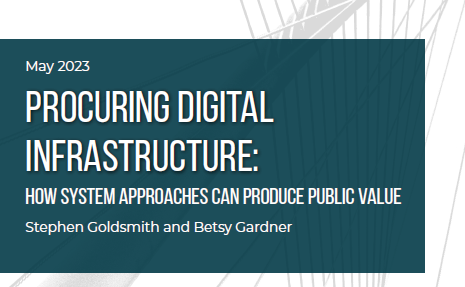- May 22, 2023
- City Administration
Technological breakthroughs, substantial federal funding, necessity, and public officials more accustomed to data and digital processes combine to present a multi-generational opportunity to transform the delivery of public services. The most powerful transformations and contributions to public value arise when officials utilize digital infrastructure to conceptualize, buy, and build at the system level.
These system solutions range from how regions build area, workforces to how they manage urban mobility to how they facilitate competing uses along their curbs and sidewalks. These advancements require complex relationships with the private sector that carry risks as well. Of course, public private partnerships (P3s) are not new; indeed, our university engaged in a public private agreement in 1640, when Harvard College partnered with the Massachusetts Bay Colony over the revenue from operating the public Boston-Charlestown ferry. Rather these digital public, private, nonprofit networks present new issues, putting additional pressure on government to structure and manage the relationships correctly.
The first step in these digital breakthroughs involves approaching an important public matter at the system level, and not at the agency or problem level. When innovating with a new digital process officials can benefit by combining best practices from two other related disciplines – cross sector collaboration and the development of physical infrastructure P3s.
This paper therefore looks at how digital infrastructure can best be procured and utilized to produce new benefits by producing collaborative or network approaches through the application of P3 principles that produce more resident engagement and equity. Digital infrastructure can mean many things, yet in this paper we define it as the opportunity to modernize asset management, augmented by federal funding, which will often involve hybrid physical-digital systems. The differentiating characteristics of a digital P3, whether standing on its own or part of the design, construction, or management of physical infrastructure must be clearly defined, particularly given the dramatic increases in federal funding for smart, connected, and digital projects. These characteristics include intangibility, scalability, interoperability, and multitenancy, all of which require modified procurement approaches.
While there are clear advantages to digital P3s, such as access to technical expertise, increased speed and efficiency, and the potential for real-time updates and improvements, this paper will also highlight concerns that must be addressed. Those concerns include scoping, data privacy, security, and ownership and procurement challenges that include scoring bids to capture life-cycle savings or benefits in terms of livability or equity.
With a goal to facilitate these contracts more broadly, with more imagination, and with more community involvement, we propose the following criteria to be addressed in procurement: defining the scope and criteria for contractor selection; dealing with intellectual property, addressing data ownership and privacy; correcting for imbalanced expertise; ensuring incentive congruence; streamlining the digital engagement process; and considering the increased complexity of off ramps. We conclude this discussion by suggesting the application of progressive P3s to adapt to the range and promise of digital solutions and offering nascent models for P3s of the future.
Download and continue to read Implementing Procuring Digital Infrastructure here.


 Stephen Goldsmith is the Derek Bok Professor of the Practice of Urban Policy at the Harvard Kennedy School and the
Stephen Goldsmith is the Derek Bok Professor of the Practice of Urban Policy at the Harvard Kennedy School and the 


